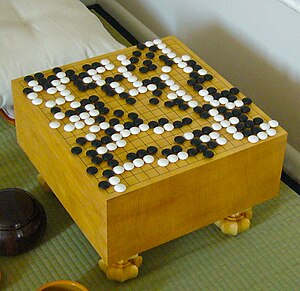Go (gemme)
abstract strategy buird gemme for twa players, in which the aim is tae surroond mair territory nor the opponent
(Reguidit frae Go)
Go (tradeetional Cheenese: 圍棋; semplifee'd Cheenese: 围棋; pinyin: ![]() wéiqí; Japanese: 囲碁; rōmaji: igo[nb 2]; Korean: 바둑; romaja: baduk[nb 3]; literally: "encirclin gemme") is an abstract strategy buird gemme for twa players, in which the aim is tae surroond mair territory nor the opponent.
wéiqí; Japanese: 囲碁; rōmaji: igo[nb 2]; Korean: 바둑; romaja: baduk[nb 3]; literally: "encirclin gemme") is an abstract strategy buird gemme for twa players, in which the aim is tae surroond mair territory nor the opponent.
 Go is played on a grid of black lines (usually 19×19). Game pieces, cried stanes, are played on the lines' intersections. | |
| Years active | prior tae Zhou Dynasty (1046–256 BCE) tae present |
|---|---|
| Genre(s) | Buird gemme Abstract strategy gemme |
| Players | 2 |
| Age range | 3+[1][nb 1] |
| Setup time | Minimal |
| Playin time | Casual: 20–90 minutes Toornament: 1–6 oors[a] |
| Random chance | None |
| Skill(s) required | Strategy, tactics, observation |
| Synonym(s) | Igo / Paduk Baduk |
| a Some Japanese perfaisional gemmes exceed 16 hours an are played in sessions spread over two days. | |
| Go | |||||||||||||||||||||||||
|---|---|---|---|---|---|---|---|---|---|---|---|---|---|---|---|---|---|---|---|---|---|---|---|---|---|
| Chinese name | |||||||||||||||||||||||||
| Traditional Chinese | 圍棋 | ||||||||||||||||||||||||
| Simplified Chinese | 围棋 | ||||||||||||||||||||||||
| Leeteral meanin | "encirclement chess" | ||||||||||||||||||||||||
| |||||||||||||||||||||||||
| Korean name | |||||||||||||||||||||||||
| Hangul | 바둑 | ||||||||||||||||||||||||
| |||||||||||||||||||||||||
| Japanese name | |||||||||||||||||||||||||
| Kanji | 囲碁 | ||||||||||||||||||||||||
| |||||||||||||||||||||||||
Notes
eedit- ↑ Children below a certain age may swallow or choke on stones.
- ↑ The full Japanese name igo is derived frae its Cheenese name weiqi (Middle Chinese "hjwɨj-gi"), which rouchly translates as "buird gemme o surroondin".
- ↑ The Korean wird 'baduk' derives frae the Middle Korean wird 'Badok', the oreegin o which is controversial; the mair plausible etymologies include the suffix '-ok' addit tae 'Bad' creautin the meanin 'flat an wide buird', or the jynin o 'Bad', meanin 'field', an 'Dok', meanin 'stane'. Less plausible etymologies include a derivation o 'Badukdok', referrin tae the playin pieces o the gemme, or a derivation frae Cheenese 排子, meanin 'tae arrange pieces'.See 조, 항범 (8 October 2005). 그런 우리말은 없다. 태학사. ISBN 9788959660148. Retrieved 3 Juin 2014.
References
eedit- ↑ "Info for School Teachers and other Youth Go Organisers". British Go Association. Who can play go?. Retrieved 10 August 2011.
See also
eedit- Nihon Ki-in - Go organisation at Tokyo, Japan
- Chizu Kobayashi, Sachiko Hara, Tomoko Ogawa - former directors at Nihon Ki-in
- Kansai Ki-in - Go organisation at Osaka
- Female Go players
- Joanne Missingham - First perfaisional player frae Oceania
- Rui Naiwei - First female 9-dan player in China
- European Go Federation